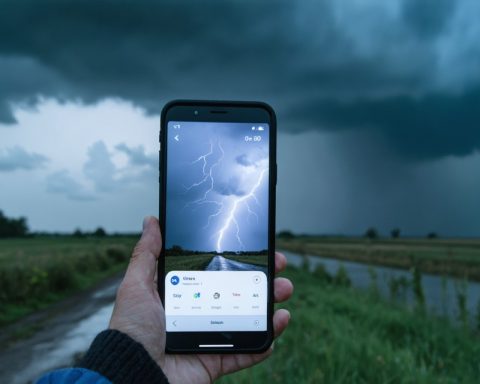- International UFO Day, observed on July 2nd, celebrates UFOs and prompts global curiosity about extraterrestrial existence.
- The event traces back to the 1947 Roswell incident, a controversial crash that fueled lasting speculation on alien life.
- UFOs have transitioned from obscure theories to cultural phenomena, significantly influenced by the film industry.
- The 1950s saw heightened interest in UFOs due to societal anxieties, reflected in classic films exploring the unknown.
- Recent U.S. declassification of UFO sightings has revived public interest, merging fiction with scientific exploration.
- High-tech systems and transparency are moving UFOs from fantasy toward legitimate scientific inquiry.
- International UFO Day provokes debate, offering a unique platform to blend science and culture, sparking cosmic curiosity.
On July 2nd, the world turns its gaze to the skies to celebrate International UFO Day, an event that beckons both believers and skeptics to ponder the mysteries of the universe. This annual occasion harks back to the notorious Roswell incident of 1947, where a peculiar crash in New Mexico sparked intrigue and controversy—fueling decades of speculation about visitors from beyond the stars.
As the legend of Roswell grows, so does the fascination with UFOs, transforming them from fringe conspiracy theories into a captivating cultural phenomenon. Dr. Jacek Rokosz, a film expert, notes the silver screen’s pivotal role in magnifying this allure. Ever since Georges Méliès sent characters to the moon in 1902, UFOs have fascinated audiences, soaring to new heights during the anxiety-laden 1950s. Movies like “Earth vs. the Flying Saucers” captured imaginations with cutting-edge effects, mirroring societal fears of the unknown and the technological marvels of the era.
But what makes today’s UFO discourse even more intriguing is the evolving landscape of research and acknowledgment. The recent declassification of numerous UAP sightings by the U.S. government has invigorated public interest, blurring the lines between science fiction and reality. With the advent of high-tech tracking systems and increased governmental transparency, what seemed like fantasy is edging closer to scientific discourse.
International UFO Day invites a global conversation—provoking curiosity and debate. While some argue the topic distracts from pressing issues, others see an opportunity to merge science with popular culture, enhancing public engagement and exploration. As we cast our eyes toward the cosmos, the mysteries of unidentified flying objects continue to challenge and inspire humanity, urging us to contemplate our place in the universe.
UFOs and Beyond: Unveiling the 21st Century Space Enigma
Pros and Cons of UFO Discourse in Modern Times
Pros:
1. Scientific Investigation: The declassification of UFO or Unidentified Aerial Phenomena (UAP) sightings by the U.S. government encourages rigorous scientific inquiry, pulling the subject from the realm of speculation into one that demands empirical study.
2. Public Engagement: UFOs have an unparalleled ability to captivate the public’s imagination, sparking discussions that merge scientific curiosity with cultural storytelling.
3. Technological Advancements: Interest in UFOs drives the development of sophisticated observational technologies, improving humanity’s ability to monitor the skies and beyond.
Cons:
1. Distraction: Some argue that the focus on UFOs detracts from pressing global challenges such as climate change and socioeconomic inequalities.
2. Stigmatization: The topic often carries societal stigma, potentially discouraging serious scientific endeavors due to fear of ridicule.
3. Misinformation: The subject is rife with misinformation, making it difficult to separate credible research from conspiracy theories.
Recent Innovations and Security Aspects in UFO Tracking
Recent advancements in radar, satellite, and AI technologies have revolutionized the monitoring of aerial phenomena. High-resolution imaging and machine learning algorithms are now employed to classify and analyze UAP sightings more accurately. Governments worldwide are investing in secure data-sharing platforms to collaborate internationally on these insights, emphasizing transparency while protecting sensitive information.
Predictions: The Future of UFO Discourse and Research
The next decade promises significant developments in the field of UFO research:
– Increased Global Cooperation: As nations express mutual interest in understanding aerial anomalies, increased international cooperation will likely lead to shared databases and joint research ventures.
– Augmented Reality (AR) in Research: AR can transform the study of UFOs by allowing researchers to simulate sightings and analyze data in immersive environments, leading to deeper insights and hypotheses formation.
– Enhanced Public Accessibility: As more data becomes available, platforms may emerge to allow the public to engage directly with UAP research, potentially crowd-sourcing solutions to longstanding mysteries.
Key Questions Explored
1. How has the public’s perception of UFOs evolved with modern technology?
With the advent of smartphones and social media, the public can share and access sightings and information instantaneously. This democratization of information has heightened global interest and brought more public scrutiny to governmental claims and disclosures, enriching the dialogue about UAPs.
2. How do governments balance transparency and security in UFO research?
Governments are adopting a careful approach, releasing declassified information incrementally while ensuring sensitive data doesn’t compromise national security. This balance helps quell public speculation while maintaining essential protective measures.
3. What role does popular culture play in shaping UFO discourse?
Movies, books, and media have a profound effect on how UFOs are perceived by the public. They can either sensationalize or demystify the topic, influencing public opinion and governmental policy. The synergy between entertainment and factual discourse can drive new generations towards scientific exploration.
For further exploration of UFO studies and insights, visit the official website for reliable resources in this field: NASA.


















